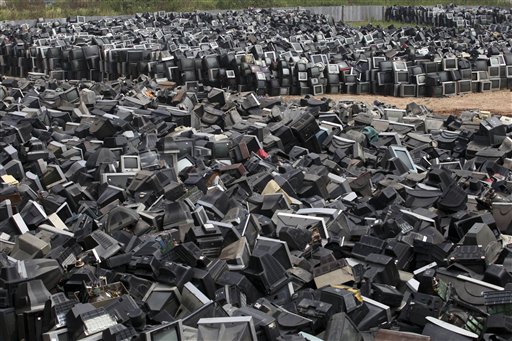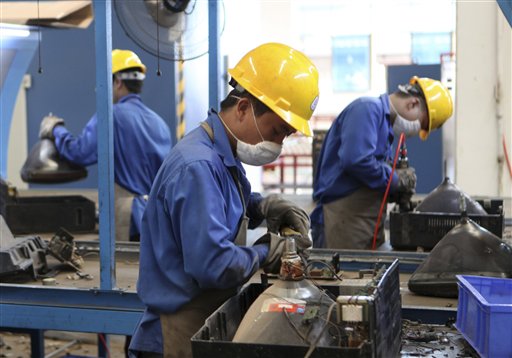BEIJING – China for years has welcomed the world’s trash, creating a roaring business in recycling and livelihoods for tens of thousands. Now authorities are clamping down on an industry that has helped the rich West dispose of its waste but also added to the degradation of China’s environment.
The Chinese campaign is aimed at enforcing standards for waste imports after Beijing decided too many were unusable or even dangerous and would end up in its landfills. Under the crackdown dubbed Green Fence, China has rejected hundreds of containers of waste it said were contaminated or that improperly mixed different types of scrap.
It is abruptly changing a multibillion-dollar global industry in which China is a major processing center for the world’s discarded soft drink bottles, scrap metal, electronics and other materials. Whole villages in China’s southeast are devoted to processing single products, such as electronics. Household workshops break down discarded computers or appliances to recover copper and other metals. Some use crude smelters or burn leftover plastic and other materials, releasing lead and other toxins into the air. Green Fence is in line with the ruling Communist Party’s pledges to make the economy cleaner and more efficient after three decades of breakneck growth that fouled rivers and left China’s cities choking on smog.
Brian Conners, who works for a Philadelphia company that recycles discarded refrigerators, says buyers used to visit every week looking for scrap plastic to ship to China for reprocessing. Then Beijing launched its crackdown in February aimed at cleaning up the thriving but dirty recycling industry.
“Now they’re all gone,” said Conners, president of ARCA Advanced Processing.
American and European recyclers send a significant part of their business to China and say they support higher quality standards. But stricter scrutiny has slowed imports and raised their costs. The decline in the number of traders buying scrap to ship to China has also depressed prices American and European recycling companies can get for their plastic and metals.
“While we support Green Fence, it has increased our cost of doing business,” said Mike Biddle, founder of MBA Polymers, a plastics recycler with facilities in California, Europe and China. “It takes longer and there are more inspections.”
At the same time, people in the industry say recyclers that invest in cleaner technology might be rewarded with more business as dirtier competitors are forced out of the market. The crackdown also might create new opportunities to process material in the United States and Europe instead of shipping it around the globe.
China’s recycling industry has boomed over the past 20 years. Its manufacturers needed the metal, paper and plastic and Beijing was willing to tolerate the environmental cost. Millions of tons of discarded plastic, computers, electronics, newspapers and shredded automobiles and appliances are imported every year from the U.S., Europe and Japan.
But environmentalists have long complained the industry is poisoning China’s air, water and soil. And Beijing, ever vigilant about possible threats to the legitimacy of one party rule, now wants to be seen as addressing increased public awareness and concern over pollution.
“The waste recycling system in China really needs to be updated to reduce pollution,” said Lin Xiaozhu, head of the solid- waste program for the Chinese group Friends of Nature.
In 2011, recycled scrap supplied some 21 percent of the nearly 100 million tons of paper used by Chinese industry, according to the state-run newspaper China Daily. It said that resulted in a savings of 18.7 million tons of wood.
In Europe, electronics recyclers recover about 2.2 million tons of plastic and metal annually and send about 15 to 20 percent of that to China, according to Norbert Zonnefeld, executive secretary of the European Electronics Recyclers Association. Its 40 member companies include electronics manufacturers and copper smelters.
European recyclers welcome China’s tighter enforcement because it will help them comply with European Union rules on tracking waste and ensuring it is properly handled, said Zonnefeld. Still, he said, some traders have run into trouble.
“I have heard material has been sent back,” said Zonnefeld. “Of course, they should have known. They were just gambling.”
The U.S. relies more heavily on China to recycle its waste.
Americans threw away 32 million tons of plastic in the form of packaging, appliances, plates and cups last year, according to the U.S. Environmental Protection Agency. About 1.1 million tons was collected for recycling.
About half of plastic soft drink and water bottles collected in the U.S. for recycling are sent to China, said Kim Holmes, director of recycling for the Society of the Plastics Industry in Washington. She said nearly all plastic from U.S. electronics waste is exported to Asia.
“The export market is a major component of the broader U.S. recycling industry,” said Holmes in an email.
China allows waste shipments to contain no more than 1 percent unrelated material. But Customs officials say some were found to be up to 40 percent unrecyclable trash.
“Some unscrupulous traders, in order to maximize profit, smuggle medical and other waste inside shipments, a direct threat to everyone’s health,” said a Shanghai Customs Bureau statement in April.
Despite a ban on imports of used tires, inspectors intercepted a 115-ton shipment of them in March, the bureau said. They were labeled “recycled rubber bands.”
In a reflection of more stringent controls, customs data show Chinese imports of waste plastic fell 11.3 percent in the first half of this year compared with a year earlier to 3.5 million tons after soaring over the past decade.
MBA Polymer’s facility in the southern city of Guangzhou, in the heart of China’s manufacturing industry, can process 40,000 tons of plastic a year, according to Biddle. It transforms waste into pellets to be used as raw material for new products.
Biddle said he welcomes Green Fence despite the disruption of imports because higher standards will favor more responsible companies.
“We’ve had to compete for raw materials with people who treat the materials not in ways that protect workers or the environment,” Biddle said. “I see China moving toward encouraging companies like ours to develop.”
Send questions/comments to the editors.




Success. Please wait for the page to reload. If the page does not reload within 5 seconds, please refresh the page.
Enter your email and password to access comments.
Hi, to comment on stories you must . This profile is in addition to your subscription and website login.
Already have a commenting profile? .
Invalid username/password.
Please check your email to confirm and complete your registration.
Only subscribers are eligible to post comments. Please subscribe or login first for digital access. Here’s why.
Use the form below to reset your password. When you've submitted your account email, we will send an email with a reset code.